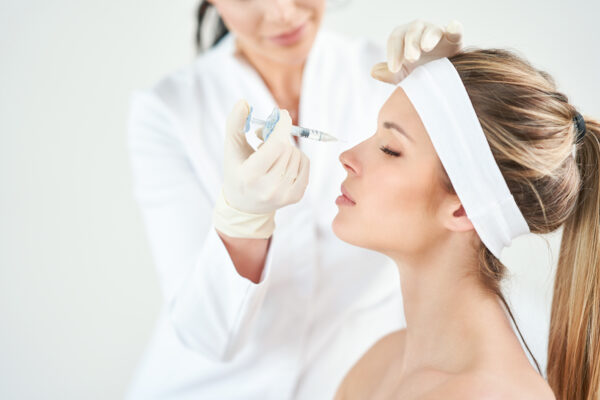
Injections of botulinum toxin, when given by a qualified medical professional, carry very little risk.
According to recent research, nine out of ten beauty clinics advertise Botox in violation of the law, which has caused new questions to be raised about Britain’s £3.6 billion cosmetic treatments market.
One London university investigation revealed that 88% of the city’s clinics were breaking laws intended to protect the public’s health by violating the ban on the advertising of Botox and other botulinum toxin products.
What exactly is Botox?
Botox is just one of seven brands or types of botulinum toxin that are available and used in the cosmetics industry in the United Kingdom; the others are less well-known. Botulinum toxin is generally, but often wrongly, referred to as “Botox.”
Botulinum toxins come in seven different varieties, despite popular belief that “Botox” refers to all of them. Other examples are Xeomin, Azzalure, Dysport, Vistabel, and Bocouture.
Confusion can result from the fact that Allergan’s Botox is by far the most well-known brand of botulinum toxin due to the fact that it was the first to hit the market.
What are the medical applications of Botox and the other botulinum toxins?
Botulinum toxin is used for the treatment of a variety of medical conditions, including those characterized by involuntary muscle movements, such as migraine headaches, neck spasms, excessive sweating, an overactive bladder, or a lazy eye.
However, its fame as a beauty treatment has helped it gain widespread attention. Being a toxin that temporarily paralyzes muscles, it has found a prominent place in the rapidly growing non-surgical aesthetic treatment industry. Botulinum toxin injections calm the facial muscles. That’s why it’s so popular for getting rid of crow’s feet and frown lines and other signs of aging.
The treatments usually have a duration of three to four months and cost anywhere from one hundred to three hundred and fifty pounds.
To what end are more and more people getting Botox and other botulinum toxin injections?
It’s clear that business is thriving. According to the latest data on cosmetic injection clinics, the [cosmetic botulinum toxin] market is expected to expand at a CAGR of 12.4% between 2022 and 2030.
There has been a dramatic increase in the number of people willing to undergo non-invasive cosmetic procedures in the name of looking better. People undergoing other cosmetic procedures like dermabrasion, chemical peels, and laser hair removal fall into this category as well.
An estimated £3.6 billion was generated by the cosmetic treatment industry in 2015. That number, however, is likely to have grown since then, thanks to the proliferation of cosmetic surgery centers.
Earlier this year, the Commons Health and Social Care Select Committee looked into the effects of body image problems on both mental and physical health. Researchers found that more people are being exposed to idealized body types because of the proliferation of social media and online advertising. The commission also heard that dissatisfaction with one’s body image and the negative health effects associated with it can affect people of any gender, sexual orientation, ethnic background, or age. The members of parliament have expressed their concern regarding the large number of young people under the age of 18 who are dissatisfied with their appearance.
In addition, experts believe that celebrities’ openness about their beauty routines, like Kylie Jenner’s, has helped normalize the idea of getting plastic surgery.

Incorrect botulinum toxin injections can result in discomfort, bruising, swelling, headaches, partial paralysis of the face, and even disfigurement.
What are the potential side effects of Botox and similar botulinum toxin injections?
If administered by a trained medical professional, botulinum toxin injections pose minimal risk. However, there are risks; unforeseen events do occur.
Incorrect injections can lead to pain, swelling, bruising, headache, partial facial paralysis, or even disfigurement, according to a study conducted in the United States in 2020. Many famous people, including actors and TV hosts, have been caught on camera with frozen features after receiving injections.
According to new research, the growing number of clinics and individuals offering botulinum toxin and dermal fillers for cosmetic purposes poses serious threats to public health.
What laws apply to the use of botulinum toxin in the UK?
There is a need for stricter regulation in the United Kingdom in order to protect customers, but no government there has taken the necessary steps to implement this need.
Botulinum toxin injections require a prescription from a medical professional such as a doctor, dentist, or nurse; however, they are frequently administered by those without proper training. For many years, there has been worry about their lack of training.
As a controlled medication, botulinum toxin is theoretically protected by a number of safeguards, including a prohibition on advertising. However, dermal fillers, which are also injected into people’s faces and lips for cosmetic reasons, are only considered a “medical device,” so there are no restrictions on advertising them.
Dermal fillers should be reclassified so that they have the same legal standing as botulinum toxin. Nonetheless, ministers have disregarded the recommendation thus far.
But in 2021, English law was changed to prohibit cosmetic clinics from treating minors with Botox or dermal lip fillers.
Dentox is a training program that educates medical professionals on the safest and most effective methods for injecting Botox into patients. You can find courses that involve live patients at https://dentox.com/live-courses/, and you can find online options at https://dentox.com/all-courses/botox-training/.







